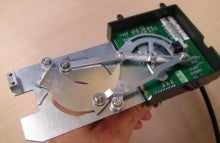If you would like to see more information on this case study, click here!
You can request this case study and a WCDE staff member will get back to you.
 Christie Digital Systems Inc. (Christie) has established a global reputation as the world’s single source manufacturer of a variety of display technologies and solutions for cinema, large audience environments, business presentations, simulation, 3D and virtual reality. The company has a wide global presence that includes manufacturing facilities in Kitchener, Ontario, Canada. The Kitchener branch houses the Business Products Sustaining Department. The teams in this department handle projects related to the company’s business products, such as projectors and integrated projection systems, and are responsible for maintaining current product lines as well as designing new business projection solutions. The Sustaining team is directly responsible for resolving problems related to products currently on the market, which includes dealing with components that are approaching obsolescence. For example, the dynamic iris shown in Figure 1, is a projector component that restricts the amount of light used to project images according to specific brightness and contrast requirements. The Allegro A3936 motor controller used in Christie Digital products to control 3-phase brushless DC motors in dynamic iris applications is expected to become obsolete. Therefore, an alternate component must be selected and tested to suit this application.
Christie Digital Systems Inc. (Christie) has established a global reputation as the world’s single source manufacturer of a variety of display technologies and solutions for cinema, large audience environments, business presentations, simulation, 3D and virtual reality. The company has a wide global presence that includes manufacturing facilities in Kitchener, Ontario, Canada. The Kitchener branch houses the Business Products Sustaining Department. The teams in this department handle projects related to the company’s business products, such as projectors and integrated projection systems, and are responsible for maintaining current product lines as well as designing new business projection solutions. The Sustaining team is directly responsible for resolving problems related to products currently on the market, which includes dealing with components that are approaching obsolescence. For example, the dynamic iris shown in Figure 1, is a projector component that restricts the amount of light used to project images according to specific brightness and contrast requirements. The Allegro A3936 motor controller used in Christie Digital products to control 3-phase brushless DC motors in dynamic iris applications is expected to become obsolete. Therefore, an alternate component must be selected and tested to suit this application.
Tim Boyadjian, a co-op student from the University of Waterloo, was asked to investigate alternative components to replace this component.
The learning objective of this case is to illustrate electrical components selection and circuit analysis. The case will give students the opportunity to evaluate commercially available components and develop a test mechanism.
If you would like to see more information on this case study, click here!
You can request this case study and a WCDE staff member will get back to you.
Contact Waterloo Cases in Design Engineering
Steve Lambert
Tel: (519) 888-4728
Email: steve@uwaterloo.ca
The University of Waterloo acknowledges that much of our work takes place on the traditional territory of the Neutral, Anishinaabeg, and Haudenosaunee peoples. Our main campus is situated on the Haldimand Tract, the land granted to the Six Nations that includes six miles on each side of the Grand River. Our active work toward reconciliation takes place across our campuses through research, learning, teaching, and community building, and is co-ordinated within the Office of Indigenous Relations.